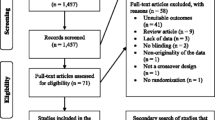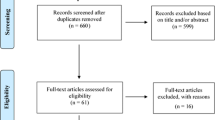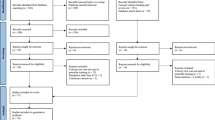Abstract
Background
Several studies investigated the effects of caffeine supplementation on movement velocity in resistance exercise. However, these studies presented inconsistent findings.
Objective
This paper aimed to: (a) review the studies that explored the effects of caffeine supplementation on movement velocity in resistance exercise; and (b) pool their results using a meta-analysis.
Methods
A search for studies was performed through seven databases. Random-effects meta-analyses of standardized mean differences (SMD) were performed to analyze the data. Sub-group meta-analyses explored the effects of caffeine on different velocity variables (i.e., mean and peak velocity), different loads (i.e., low, moderate, and high loads), and upper- and lower-body exercises.
Results
Twelve studies met the inclusion criteria. In the main meta-analysis, in which we pooled all available studies, the SMD favored the caffeine condition (SMD = 0.62; 95% confidence interval [CI]: 0.39–0.84; p < 0.001). Sub-group analyses indicated that caffeine significantly enhances mean (SMD = 0.80; 95% CI: 0.48–1.12; p < 0.001) and peak velocity (SMD = 0.41; 95% CI: 0.08–0.75; p = 0.014), movement velocity with low loads (SMD = 0.78; 95% CI: 0.41–1.14; p < 0.001), moderate loads (SMD = 0.58; 95% CI: 0.25–0.91; p = 0.001), and high loads (SMD = 0.70; 95% CI: 0.33–1.07; p < 0.001), as well as in lower-body (SMD = 0.82; 95% CI: 0.42–1.23; p < 0.001) and upper-body exercises (SMD = 0.59; 95% CI: 0.37–0.82; p < 0.001).
Conclusion
Acute caffeine supplementation is highly ergogenic for movement velocity in resistance exercise. Sub-group analyses indicated that caffeine ingestion is ergogenic: (a) for both mean and peak velocity; (b) for movement velocity when exercising with low, moderate and high loads, and (c) for movement velocity in both lower- and upper-body exercises. Previous meta-analyses that explored the effects of caffeine on various aspects of resistance exercise performance (i.e., muscular strength and endurance) reported trivial to moderate ergogenic effects (effect size range: 0.16–0.38). In the present meta-analysis, the pooled effect size ranged from 0.41 to 0.82. From a resistance exercise performance standpoint, this suggests that caffeine has the most pronounced performance-enhancing effects on movement velocity.





Similar content being viewed by others
References
Maughan RJ, Burke LM, Dvorak J, et al. IOC consensus statement: dietary supplements and the high-performance athlete. Int J Sport Nutr Exerc Metab. 2018;28(2):104–25.
Van Thuyne W, Delbeke F. Distribution of caffeine levels in urine in different sports in relation to doping control before and after the removal of caffeine from the WADA doping list. Int J Sports Med. 2006;27(9):745–50.
Grgic J, Pickering C. The effects of caffeine ingestion on isokinetic muscular strength: a meta-analysis. J Sci Med Sport. 2019;22(3):353–60.
Warren GL, Park ND, Maresca RD, et al. Effect of caffeine ingestion on muscular strength and endurance: a meta-analysis. Med Sci Sport Exerc. 2010;42(7):1375–87.
Grgic J, Trexler ET, Lazinica B, et al. Effects of caffeine intake on muscle strength and power: a systematic review and meta-analysis. J Int Soc Sports Nutr. 2018;15(1):11.
Grgic J, Sabol F, Venier S, et al. Caffeine supplementation for powerlifting competitions: an evidence-based approach. J Hum Kinet. 2019;68:37–48.
Grgic J, Sabol F, Venier S, et al. What dose of caffeine to use: acute effects of 3 doses of caffeine on muscle endurance and strength. Int J Sports Physiol Perform. 2019. https://doi.org/10.1123/ijspp.2019-0433.
Grgic J, Mikulic P. Caffeine ingestion acutely enhances muscular strength and power but not muscular endurance in resistance-trained men. Eur J Sport Sci. 2017;17(8):1029–36.
Goldstein E, Jacobs PL, Whitehurst M, et al. Caffeine enhances upper body strength in resistance-trained women. J Int Soc Sports Nutr. 2010;7:18.
Grgic J, Mikulic P, Schoenfeld BJ, et al. The influence of caffeine supplementation on resistance exercise: a review. Sports Med. 2019;49(1):17–30.
García-Ramos A, Pestaña-Melero FL, Pérez-Castilla A, et al. Mean velocity vs. mean propulsive velocity vs. peak velocity: which variable determines bench press relative load with higher reliability? J Strength Cond Res. 2018;32(5):1273–9.
Del Coso J, Salinero JJ, Gonzalez-Millan C, et al. Dose response effects of a caffeine-containing energy drink on muscle performance: a repeated measures design. J Int Soc Sports Nutr. 2012;9(1):21.
Diaz-Lara FJ, Del Coso J, García JM, et al. Caffeine improves muscular performance in elite Brazilian Jiu-jitsu athletes. Eur J Sport Sci. 2016;16(8):1079–86.
Diaz-Lara FJ, Del Coso J, Portillo J, et al. Enhancement of high-intensity actions and physical performance during a simulated Brazilian Jiu-Jitsu competition with a moderate dose of caffeine. Int J Sports Physiol Perform. 2016;11(7):861–7.
Goggin C, Kirk S, Powers CM, et al. Effects of Via® instant coffee on explosive squat performance. Ann Nutr Metab. 2013;63(Suppl 1):566.
Lane MT, Byrd MT. Effects of pre-workout supplements on power maintenance in lower body and upper body tasks. J Funct Morphol Kinesiol. 2018;3:11.
Lane MT, Byrd MT, Bell Z, et al. Effects of supplementation of a pre-workout on power maintenance in lower body and upper body tasks in women. J Funct Morphol Kinesiol. 2019;4:18.
Mora-Rodriguez R, Garcia Pallares J, Lopez-Samanes A, et al. Caffeine ingestion reverses the circadian rhythm effects on neuromuscular performance in highly resistance-trained men. PLoS ONE. 2012;7(4):e33807.
Mora-Rodríguez R, Pallarés JG, López-Gullón JM, et al. Improvements on neuromuscular performance with caffeine ingestion depend on the time-of-day. J Sci Med Sport. 2015;18(3):338–42.
Pallarés JG, Fernández-Elías VE, Ortega JF, et al. Neuromuscular responses to incremental caffeine doses: performance and side effects. Med Sci Sports Exerc. 2013;45(11):2184–92.
Powers CM, Kirk S, Goggin C, et al. Via® instant coffee enhance explosive bench press squat performance. Ann Nutr Metab. 2013;63(Suppl 1):566.
Venier S, Grgic J, Mikulic P. Acute enhancement of jump performance, muscle strength, and power in resistance-trained men after consumption of caffeinated chewing gum. Int J Sports Physiol Perform. 2019. https://doi.org/10.1123/ijspp.2019-0098.
Wise A, Frank M, Holy A, et al. The effects of VIA® instant coffee on bench press performance: a gender comparison. J Int Soc Sports Nutr. 2014;11(Suppl 1):P13.
Moher D, Liberati A, Tetzlaff J, et al. Preferred reporting items for systematic reviews and meta-analyses: the PRISMA statement. PLoS Med. 2009;6(7):e1000097.
Borenstein M, Hedges LV, Higgins JPT, et al. Introduction to meta-analysis. Chichester: Wiley; 2009.
Smart NA, Waldron M, Ismail H, et al. Validation of a new tool for the assessment of study quality and reporting in exercise training studies: TESTEX. Int J Evid Based Healthc. 2015;13(1):9–18.
Maher CG, Sherrington C, Herbert RD, et al. Reliability of the PEDro scale for rating quality of randomized controlled trials. Phys Ther. 2003;83(8):713–21.
Follmann D, Elliott P, Suh I, et al. Variance imputation for overviews of clinical trials with continuous response. J Clin Epidemiol. 1992;45(7):769–73.
Cohen J. Statistical power analysis for the behavioral sciences. Hillsdale: L. Erlbaum Associates; 1988.
Soriano MA, Jiménez-Reyes P, Rhea MR, et al. The optimal load for maximal power production during lower-body resistance exercises: a meta-analysis. Sports Med. 2015;45(8):1191–205.
Soriano MA, Suchomel TJ, Marín PJ. The optimal load for maximal power production during upper-body resistance exercises: a meta-analysis. Sports Med. 2017;47(4):757–68.
Grgic J, Grgic I, Pickering C, et al. Wake up and smell the coffee: caffeine supplementation and exercise performance—an umbrella review of 21 published meta-analyses. Br J Sports Med. 2019. https://doi.org/10.1136/bjsports-2018-100278.
Polito MD, Souza DA, Casonatto J, et al. Acute effect of caffeine consumption on isotonic muscular strength and endurance: a systematic review and meta-analysis. Sci Sport. 2016;31(3):119–28.
Bazzucchi I, Felici F, Montini M, et al. Caffeine improves neuromuscular function during maximal dynamic exercise. Muscle Nerve. 2011;43(6):839–44.
Tarnopolsky MA. Effect of caffeine on the neuromuscular system—potential as an ergogenic aid. Appl Physiol Nutr Metab. 2008;33(6):1284–9.
Tallis J, James RS, Cox VM, et al. The effect of physiological concentrations of caffeine on the power output of maximally and submaximally stimulated mouse EDL (fast) and soleus (slow) muscle. J Appl Physiol. 2012;112(1):64–71.
Pickering C, Kiely J. Are the current guidelines on caffeine use in sport optimal for everyone? Inter-individual variation in caffeine ergogenicity, and a move towards personalised sports nutrition. Sports Med. 2018;48(1):7–16.
Sabol F, Grgic J, Mikulic P. The effects of three different doses of caffeine on jumping and throwing performance: a randomized, double-blind, crossover study. Int J Sports Physiol Perform. 2019. https://doi.org/10.1123/ijspp.2018-0884.
Cormie P, McGuigan MR, Newton RU. Developing maximal neuromuscular power: part 2—training considerations for improving maximal power production. Sports Med. 2011;41(2):125–46.
Spriet LL. Exercise and sport performance with low doses of caffeine. Sports Med. 2014;44(Suppl 2):S175–84.
Saunders B, de Oliveira LF, da Silva RP, et al. Placebo in sports nutrition: a proof-of-principle study involving caffeine supplementation. Scand J Med Sci Sports. 2017;27(11):1240–7.
Author information
Authors and Affiliations
Corresponding author
Ethics declarations
Funding
No sources of funding were used for this work.
Conflict of Interest
Javier Raya-González, Tara Rendo-Urteaga, Raúl Domínguez, Daniel Castillo, Alejandro Rodríguez-Fernández and Jozo Grgic declare that they have no conflicts of interest relevant to the content of this review.
Rights and permissions
About this article
Cite this article
Raya-González, J., Rendo-Urteaga, T., Domínguez, R. et al. Acute Effects of Caffeine Supplementation on Movement Velocity in Resistance Exercise: A Systematic Review and Meta-analysis. Sports Med 50, 717–729 (2020). https://doi.org/10.1007/s40279-019-01211-9
Published:
Issue Date:
DOI: https://doi.org/10.1007/s40279-019-01211-9




